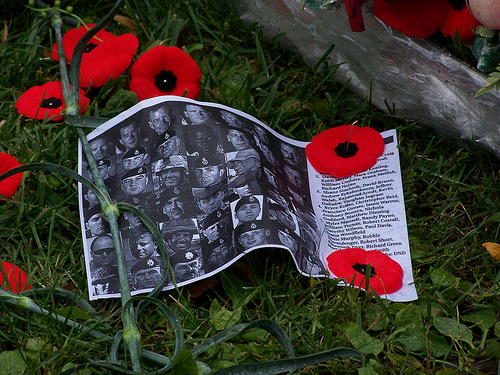By J.D.R. Brown (The Cascade) – Email
Print Edition: November 9, 2011
 There was not much fanfare or media coverage when the Canadian Forces left Kandahar Province earlier this year, and even less when Master Corporal Byron Greff was killed in Kabul nearly two weeks ago. Since the invasion of Afghanistan, I’ve witnessed a number of spasms of patriotism. Immediately following our first casualties, who were bombed by American fighter jets, there was a great hue and cry followed by an extremely well attended public memorial; the death of Captain Nichola Goddard, Canada’s first female soldier to be killed in combat, elicited a good deal of public mourning and saw her widowed husband receive the Memorial Cross. There have been others, of course, most with repatriation ceremonies and speeches from bereaved parents and opportunistic politicians, but these remain most vivid to me.
There was not much fanfare or media coverage when the Canadian Forces left Kandahar Province earlier this year, and even less when Master Corporal Byron Greff was killed in Kabul nearly two weeks ago. Since the invasion of Afghanistan, I’ve witnessed a number of spasms of patriotism. Immediately following our first casualties, who were bombed by American fighter jets, there was a great hue and cry followed by an extremely well attended public memorial; the death of Captain Nichola Goddard, Canada’s first female soldier to be killed in combat, elicited a good deal of public mourning and saw her widowed husband receive the Memorial Cross. There have been others, of course, most with repatriation ceremonies and speeches from bereaved parents and opportunistic politicians, but these remain most vivid to me.
I am not put off by public mourning, only by the nauseating rhetoric so often offered and interminable forgetfulness of the participants. And it is those two qualities that I find most often during the observance of Remembrance Day. We might buy our poppies and even shuffle on down toward the local cenotaph, but that is quite often the end of it for most. The exhortations to remember are received and chanted by us most dutifully, but all of the reflection and mindfulness of the silence is forgotten by lunchtime.
What’s left is an ersatz mourning and a Hollywood remembrance. The spectacle of television specials and movies mixed with a dogmatic, unthinking commitment to support our troops is woven into every speech and given wall-to-wall coverage for exactly one day. Most will appreciate the bombast, but for any other day of the year it is unlikely that you will find the average citizen contemplating the hell where youth and laughter go, as Sassoon would have us do.
And that is the crux of the problem. We have spent an entire decade in the middle of Central Asia, losing 157 soldiers in the process, and there has never been a clear articulation of why we are there. At first, it was to fulfil our treaty obligations as part of NATO. Then we were there to oust the Taliban and liberate Afghanistan. For awhile, we were nation-building: educating Afghan girls, building roads, and bringing democracy. But that fell by the wayside like all the others. We ended up fighting so that we wouldn’t just cut and run – perhaps to beat the Taliban into submission? But that, too, has come to an end; we are no longer sending our men and women beyond the wire to wait for that awful crack of an IED. There have been peace talks between us and the Taliban.
It is said by us every year that at the going down of the sun we will remember them – all of them, all of our brothers and sisters who have died from this war and all the others. But the reality is we do not. We do not remember them; not their lives, or their sacrifice, or the bloody wars where they bought the farm. We continue on with our petty little worries and think nothing of sending our troops every decade or so into yet another quagmire, so long as we don’t have to think about it very much.
Ypres was nearly a century ago; we ought to have learned that lesson by now.


